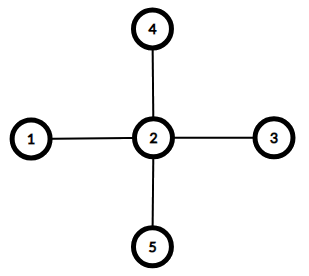CF1082D.Maximum Diameter Graph
普及/提高-
通过率:0%
AC君温馨提醒
该题目为【codeforces】题库的题目,您提交的代码将被提交至codeforces进行远程评测,并由ACGO抓取测评结果后进行展示。由于远程测评的测评机由其他平台提供,我们无法保证该服务的稳定性,若提交后无反应,请等待一段时间后再进行重试。
题目描述
Graph constructive problems are back! This time the graph you are asked to build should match the following properties.
The graph is connected if and only if there exists a path between every pair of vertices.
The diameter (aka "longest shortest path") of a connected undirected graph is the maximum number of edges in the shortest path between any pair of its vertices.
The degree of a vertex is the number of edges incident to it.
Given a sequence of n integers a1,a2,…,an construct a connected undirected graph of n vertices such that:
- the graph contains no self-loops and no multiple edges;
- the degree di of the i -th vertex doesn't exceed ai (i.e. di≤ai );
- the diameter of the graph is maximum possible.
Output the resulting graph or report that no solution exists.
输入格式
The first line contains a single integer n ( 3≤n≤500 ) — the number of vertices in the graph.
The second line contains n integers a1,a2,…,an ( 1≤ai≤n−1 ) — the upper limits to vertex degrees.
输出格式
Print "NO" if no graph can be constructed under the given conditions.
Otherwise print "YES" and the diameter of the resulting graph in the first line.
The second line should contain a single integer m — the number of edges in the resulting graph.
The i -th of the next m lines should contain two integers vi,ui ( 1≤vi,ui≤n , vi=ui ) — the description of the i -th edge. The graph should contain no multiple edges — for each pair (x,y) you output, you should output no more pairs (x,y) or (y,x) .
输入输出样例
输入#1
3 2 2 2
输出#1
YES 2 2 1 2 2 3
输入#2
5 1 4 1 1 1
输出#2
YES 2 4 1 2 3 2 4 2 5 2
输入#3
3 1 1 1
输出#3
NO
说明/提示
Here are the graphs for the first two example cases. Both have diameter of 2 .
 d1=1≤a1=2 d2=2≤a2=2
d1=1≤a1=2 d2=2≤a2=2
d3=1≤a3=2
 d1=1≤a1=1 d2=4≤a2=4
d1=1≤a1=1 d2=4≤a2=4
d3=1≤a3=1
d4=1≤a4=1